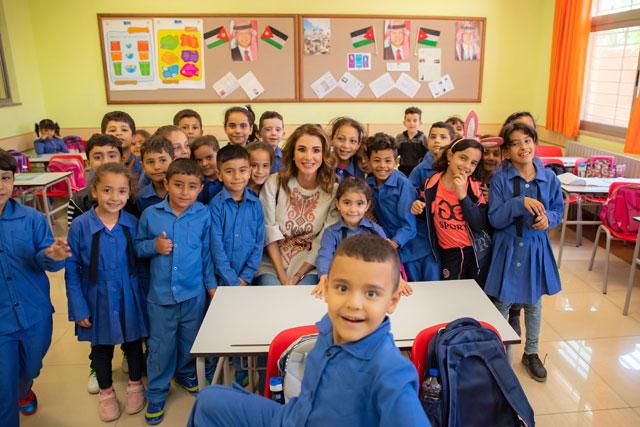You are here
‘School nutrition programme facing funding challenges’
By Abdul Rahman Bazian - Apr 02,2019 - Last updated at Apr 02,2019

Public school students pose for a group photo with one holding a package of high-nutrition food, provided by the UN World Food Programme and the Ministry of Education under the National School Feeding Programme on May 22, 2014 (Photo courtesy of the WFP)
AMMAN — In 1999, the ministries of education and health launched the student National School Nutrition Programme to provide free lunches and snacks for disadvantaged children across Jordan.
According to the Ministry of Education’s website, the programme eventually expanded its coverage to include children in kindergarten and grades one through six. As a result, the number of students benefitting from the programme increased from 170,000 students in 2006 to 387,000 in 2019.
However, officials warned that fluctuations in funding and allocation issues are threatening the programme’s coverage area and ability to keep up with Jordan’s population increase.
One of the project’s sub-segments was the establishment of a productive kitchen to serve students full meals at school, which started with 2,000 children in 2015 and grew to some 57,000 students by the end of 2018, the website said.
Beneficiaries attend 1,854 schools across the Kingdom, in 31 districts, including three UNRWA Palestinian refugee camps, the ministry’s figures show.
In a phone call with The Jordan Times, Director of the School Health Department Samar Batarseh said the Ministry of Health assumes both an administrative and supervisory role.
The programme also includes Syrian refugee children who attend the schools included in the project, Spokesperson for the Ministry of Education Walid Jallad confirmed via e-mail.
Overall, “the annual cost of the programme is estimated at JD7 million”, he said.
“No child attending any of the schools included in the programme, no matter their nationality, is excluded. Any child attending these schools, not only Syrians, but refugees of other nationalities as well, have the right to benefit from the programme, like all other children; like our own children,” Jallad highlighted.
“We do not have the statistics because we never thought to carry out a census of the nationalities of attending children. It is of no consequence to us,” he added.
“There are budgetary allocations by the ministry to fund the programme, in addition to UN World Food Programme [WFP] contributions,” he stated.
According to WFP sources, the programme covers 30,000 Syrian refugee children, including those attending UNICEF schools inside refugee camps.
Students are given date-stuffed vitamin-reinforced snacks and biscuits and, in the cases of the kitchens, children are given cooked meals on a daily basis, the ministry’s website said.
“None of the students, or their parents, is charged for the meals they receive at school,” Jallad underlined.
Work is under way to map out further expansions to include more schools and launch new kitchens in various parts of the Kingdom, pending the allocation of sufficient resources, he said.
MP Huda Otoum commended the programme’s progress over the years, but warned of what she described as “receding coverage, options and funding”.
Close to JD1 billion is allocated in finances for the Ministry of Education, but due to financial restraints on funding, the House of Representatives is cautious about boosting allocations, she underlined.
The ministry’s resources are drained mostly by its current expenses and wages, Otoum stated.
Meanwhile, “international support for the programme is fluctuating, which is why coverage is receding, along with the options available for children to choose from,” the MP stated.
At one point, she said, the programme used to cover all of the Kingdom’s public schools, including dozens across Jerash.
“Now only a limited number of schools are included in the programme, mostly in the most impoverished area. With the exception of schools in the area of Burma, most of the schools in Jerash are not included in the programme, as far as I know,” Otoum added.
The programme is shrinking, she warned.
“With the resources at hand, the ministry is doing a great job targeting some of the more vulnerable social segments and ages, but more can be done with more allocations to support more inclusive coverage,” the deputy noted.
The aim of the programme is to boost the children’s daily intake of high-nutrition foods and cultivate healthier eating habits among the students for years to come, the ministry spokesperson pointed out.
Related Articles
AMMAN — The closure of schools has not only created educational problems but also has deprived many vulnerable children of their single meal
AMMAN — Her Majesty Queen Rania marked the start of the new school year with a visit to Dulayl in Zarqa Governorate on Wednesday, where she
MADABA — A WFP project to provide meals for children of underprivileged families at schools in Jordan has also become a source of employment
















